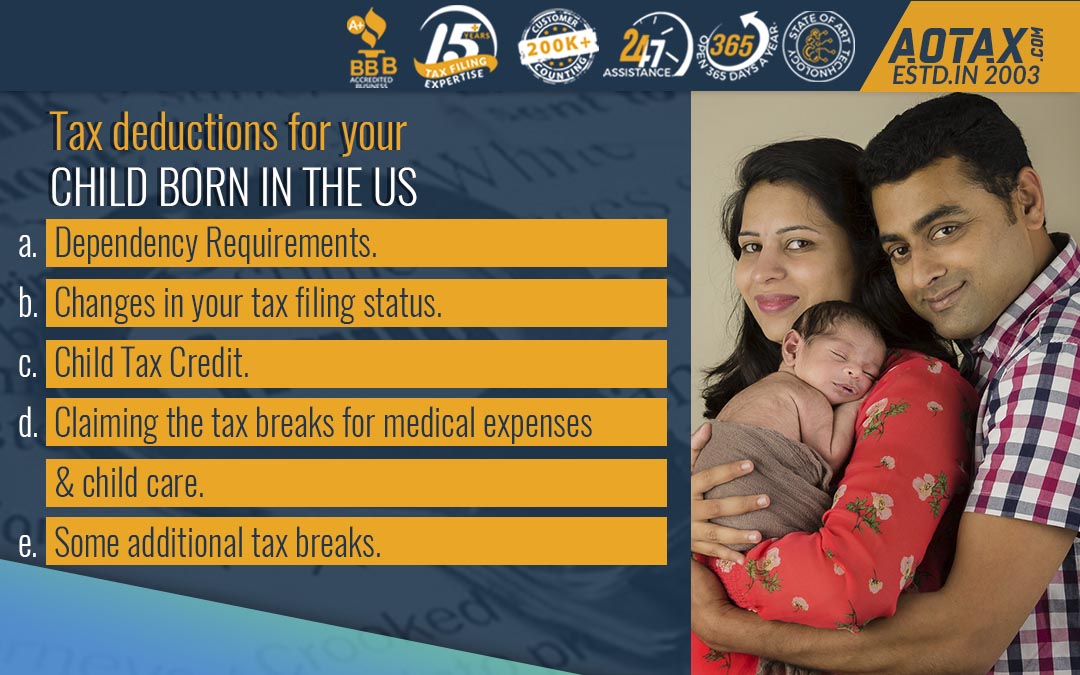Tax deductions for your child born in the US.

When the deadline for the tax return filing approaches, you should keep your details ready for review so that you do not miss any necessary detail. If you have a kid, then it is feasible that you can obtain some good tax benefits.
Dependency Requirements.
If you are going to claim your child as a dependent, then there are certain dependency requirements which your child must meet.
- Your first step is applying for the Social Security Number of your baby. It will take nearly two weeks for your Social Security Number to arrive.
- Another criterion is that your child should have been living with you for a period of more than half of the year. The time which your newborn child has spent in the hospital would not be taken into consideration here.
Changes in your tax filing status.
- In case you were single and now after having a baby you are supporting your household, your tax filing status would change to “Head of the Household”.
- By this tax filing status, you would be able to obtain a much larger standard deduction and even more favorable tax brackets.
- So, you can save more on your taxes after being the Head of Household than you were saving while you were Single.
- However, when married and having a child your filing status would not change.
Child Tax Credit.
This is considered to be one of the best tax breaks for the parents. You can claim Child Tax Credit up to $1000 for each qualifying child.
Some criteria must be met for your child to be the qualifying child.
- Relationship – If you are going to claim this credit, then your biological children, foster children, adopted kids, step-children are eligible. Moreover, some of your other family members can also qualify.
- Age – Your children must be of the age of either 16 years or younger than that to avail of this credit.
- Dependent – You will have to claim your child as your dependent on the federal taxes.
- Support – Your child should not have been provided half of the support.
- Resident – Your child should have stayed with you for nearly half of the year or more.
- Citizenship – Your child can qualify if he is a US citizen, US resident alien, or a US National.
Claiming the tax breaks for medical expenses and child care.
- Medical expenses related to the birth of your child and child care are deductible.
- These expenses are deductible only when they are exceeding 10% of your AGI (Adjusted Gross Income).
- To qualify these expenses for deductions, these expenses must be itemized.
- If you are a working parent, then you are eligible to claim credit for Qualified Child Care Expenses.
- You can also claim the Child and Dependent Care Credit if you have paid some worker or Daycare center for taking care of your child while you were working.
- To qualify for this credit, you should be able to identify the individual who has given support or taken care of your child. You and your spouse should have earned income to avail of this credit if you are filing the returns jointly. Moreover, the expenses paid for child care should not be given to your spouse or any other dependent on your tax returns.
- This credit is based on your income and can exceed up to 35% of the child care expenses which qualify for a credit. This can be up to maximum expenses of $3000 for one child and $6000 for more children.
- However, your Child and Dependent Care might get reduced if your employer is providing you with dependent care benefits that are tax-free.
Some additional tax breaks.
There are some other tax breaks which parents can enjoy such as:-
- You can qualify for obtaining the Earned Income Tax Credit.
- Any gifts i.e. in the form of money or property would be free of tax for you and your kid if received from grandparents and other relatives.
- You can also be eligible to participate in QTP i.e. Qualified Tuition Program which is being offered by your State. Even though there is no immediate break for the taxes, the earnings in the account would be tax exempted. You could also obtain state deduction or credit for the contributions made.
Conclusion.
So, these factors would help you to understand the different facets related to the tax deductions associated with your child born in the US.

Recent Comments